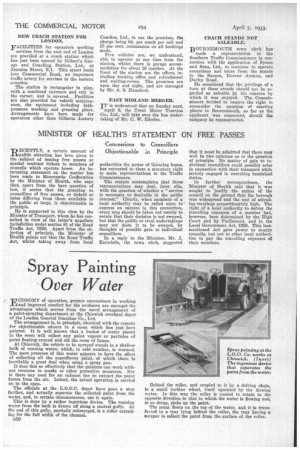MINISTER OF HEALTH'S• STATEMENT ON FREE PASSES
Page 72

If you've noticed an error in this article please click here to report it so we can fix it.
Concessions to Councillors Objectionable in Principle
..11) ECENTLY, a certain amount of public attention has been given to the 'subject of issuing free passes or special contract tickets to members of councils which operate buses. An interesting statement on the matter has been made to Morecambe Cortioration by the Minister of Health, who says that, apart from the bare question of law, it seems that the granting to councillors of free passes, or ticket g at rates differing from those available to the public at large, is objectionable in principle.
He is supported in this view by the Minister of Transport, whom he has consulted in view of the latter's appellate jurisdiction under section 81 of the Road Traffic Act, 1930. Apart from the objection of principle, the Minister of Health points out that the Road Traffic Act, whilst taking away from local authorities the power of licensing buses, has entrusted to them a statutory right to make representations to the Traffic Commissioners.
The statute contemplates that those representations may deal, inter alia, with the question of whether a "service is necessary or desirable in the public interest" Clearly, when members of a local authority may be called upon to ,express an opinion in this connection, every step should be taken not merely to secure that their decision is not swayed, but that the public or rival undertakings may not deem it to be swayed, by thoughts of possible gain to individual councillors.
In a reply to the Minister, Mr. j. Entwistle, the town clerk, suggested that it must be admitted that there may well be two opinions as to the question of principle. No matter of gain to individual councillors could possibly arise In connection with their transport while strictly engaged in executing municipal duties.
In further correspondence, the Minister of Health said that it was sought to justify the action of the council on the ground that the borough was widespread and the cost of attending meetings proportionately high. The right of a local authority to defray the travelling expenses of a member had, however, been determined by the High Court and by Parliament, and in the Local Government Act, 1929. This lastmentioned Act gave power to county councils, but not to other local authorities to pay the travelling expenses of their members.












































































































